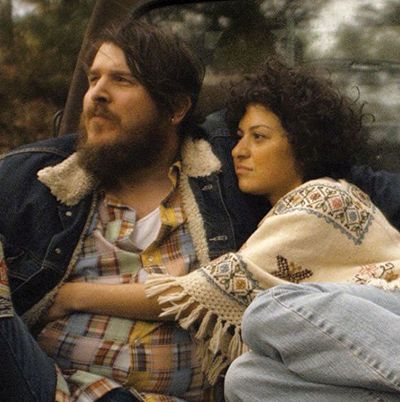
Ethan Hawke is our most-likable movie-star dilettante. He gives fine, committed performances in films (indie and studio) and still finds time and energy to do Shakespeare, compose and play music, write novels, and direct fiction and nonfiction features. Even when he’s behind the camera, you feel his curiosity and affection: He’s like an actor playing a student, chasing after people he wants to learn from and emulate. Or half-emulate, in the case of Blaze Foley, the subject of his fuzzy but moving biopic, Blaze.
In the annals of outlaw-country singers of the ’70s, Foley (né Michael David Fuller and known, for a time, as Deputy Dawg) comes chest-high at least to John Prine and Townes Van Zandt, though his career was shorter and more tumultuous, and he died unfulfilled — and violently. Writing with Foley’s ex-partner, Sybil Rosen, Hawke views the singer-songwriter’s life as a struggle between two spheres: the nurturing life force symbolized by the tree house in the woods where the couple spent a year and in which Foley found his musical voice, and the road, where Foley fell in with Van Zandt and other reckless, ungrounded artists and left Rosen behind. Van Zandt has a voice in this drama: He’s played by the chiseled, charismatic musician Charlie Sexton and tells stories about Foley to a somewhat clueless radio host (Hawke, seen from behind). It’s Van Zandt who insists that being a musician takes “blowing your family off, job, security, happiness” and finding a sphere wholly apart, to the point of courting chaos.
It’s a simple — if not simpleminded — either/or, but Hawke plainly understands that some artists are better than others at drifting between those poles, and that Foley was one of the others. Many adored him, but many feared him too, especially when alcohol and cocaine took away his defenses. Hawke has cast a talented musician, Ben Dickey, who holds his own on guitar and puts an ache in his voice without being a slob — the pain is there but channeled. His voice is higher than Foley’s — he doesn’t have the kind of iconic country baritone that makes your ears prick up at the first syllables. But a musician in the role makes a huge difference. He’s inside songs like “Clay Pigeons,” using the words and music to convey his longing and not trying to put longing into the song. That said, Dickey has a soft presence (he’s fleshy), and although the script alludes to Foley’s hell-raising, the man onscreen seems more of a wayward teddy bear. You fear for him but don’t fear him.
I loved the first half of Blaze, especially the scenes in which Foley performs his final show at the Austin Outhouse bar — arguably his finest hour, even with its semi-coherent ramblings. (The recording of the show is essential.) Hawke obviously loves hanging out with Dickey’s Foley, adjusting to his rhythms, suggesting through his pacing that he never wants to leave this milieu. You could mistake cinematographer Steve Cosens’s uninsistent framing for loose, but Cosens suggests in all kinds of ways how the settings infuse the characters, coloring their moods and even their dreams.
Hawke doesn’t have a grip on the narrative, though, largely because he doesn’t want to. He’s bent on blurring the trajectory. He jumps from Foley’s final concert to Van Zandt’s radio interview to life in that tree house and back, and he even jumps within scenes — showing characters walking away while they’re still in mid-conversation. This is what filmmakers do when they want to make a grand statement about time, about the irrelevance of labels like past, present, and future, especially when applied to timeless works of art. It’s a choice. I’d rather have seen more of the present-tense relationship between Foley and Van Zandt. Some people thought Van Zandt led Foley astray, others (including Van Zandt) that Foley left him in the dust. Their scenes are listless here — barely dramatized. They don’t spark each other creatively.
Hawke does much better with Foley and Sybil, partly because Rosen remembers what passed between them (she wrote a memoir about the relationship) and partly because the frizzy-haired Sybil is played by Alia Shawkat, who uses her considerable acting chops to keep Dickey grounded — much as Rosen kept Foley grounded. But Blaze’s best scene features Kris Kristofferson as Foley’s once-abusive, now near-senile father and Alynda Segarra as his sister, who escaped the old man’s malevolent influence by finding Jesus. Segarra and Dickey sing a sweet, sad duet, and something in Kristofferson’s eyes suggests he’s hearing it not just as the terrible father but as the singer-songwriter who knew Foley, Van Zandt, and so many others now gone and that he’s with them again. The magic in Blaze is when time stops.
*This article appears in the August 20, 2018, issue of New York Magazine. Subscribe Now!





